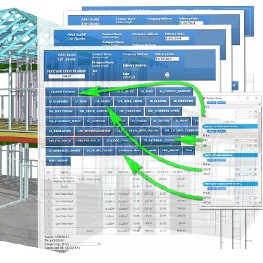
Are quantity takeaoffs and cost estimating taking you time? When it should be making you money? Are you doing more estimates to get the same amount of work? Do you need to be faster and more efficient? We have a right course for you. Planswift we train, is designed to improve accuracy, save time, and increase profit. Learn to generate digital quantity takeoffs to win more work with competitive bids that are generated from accurate estimates produced from integrated takeoffs and quantities. Create conceptual estimates for feasibility studies resulting in a range of detailed estimates that help to win work and develop sound budgets with Planswift software. Support all required processes including budgeting, resource planning, time phasing, progress and performance measurement, earned value management, cost and schedule analysis, change management, risk tracking, funds allocation, forecasting and reporting.
INSTRUCTORS:

NIYOKWIZERWA Samuel
ASSISTANT TRAINER / PROJECT MANAGMENT DEPARTMENT
PlanSwift is a construction takeoff and estimating software designed for construction professionals such as contractors, estimators, and subcontractors. It simplifies the process of quantifying materials and labor costs from digital blueprints, offering features like digitized on-screen takeoffs, customizable formulas, and compatibility with various file formats. This allows users to efficiently measure quantities, create detailed cost estimates, and generate material and labor reports for construction projects. By facilitating digital takeoffs, PlanSwift reduces errors and saves time, enabling teams to focus on critical aspects of construction. The software enhances Bill of Quantities (BOQ) management by enabling quantity surveyors to import digital blueprints, create itemized lists, and organize materials with clarity.
Planswift’s centralized approach ensures accuracy and consistency in cost estimation, providing better control over project budgets. The software also supports adjustments to quantities and item additions or removals, allowing quick updates to the BOQ as project requirements change. Additionally, Planswift improves construction cost management by incorporating cost-estimating functionality. It enables users to assign costs to BOQ items manually or automatically, providing insights into project budgets through detailed cost reports and summaries.
The software is compatible with various file formats, facilitating seamless integration with existing project workflows by importing and exporting data to and from tools like Excel, PDF, and CAD. Overall, PlanSwift enhances the speed, accuracy, and organization of the estimation process, contributing to better project planning and cost management in the construction industry.
Here is what you can expect at the end of this training:
Upon completion of this Digital BoQ Preparation training, participants will be equipped with a comprehensive skill set to deliver the following:
1. Participants gain an in-depth understanding of Bill of Quantities (BOQ) preparation,
with emphasis on the importance of accuracy, the implications of errors, and the role
of BOQ in cost estimation, procurement, and project documentation.
2. Attendees will master to navigate the PlanSwift interface, perform digital takeoffs
efficiently, and integrate the software into their workflows for improved accuracy and
speed.
3. Participants will also delve into various standard methods of measurement, such as
SMM7, EASMM, and NRM2, enhancing their ability to create precise and standardized
BOQs.
4. The training equips participants with skills in building up unit rates, analyzing material,
labor, and equipment costs, and reconciling materials for different construction
elements. This knowledge extends to construction cost management aspects like
budget preparation, resource planning, time phasing, and financial risk tracking.
5. Attendees gain practical experience in using PlanSwift for digital takeoffs, item
creation, editing, formula incorporation, and report generation. It also covers the
customization of PlanSwift through templates, parts overview, assemblies, and
advanced features.
6. Participants will learn about construction budget preparation, resource allocation,
time phasing, progress measurement, earned value management, change
management, and cost forecasting.
7. Successful completion of the training comes with the issuance of Planswift certificates,
providing participants with formal recognition of their proficiency in delivering
projects according to industry standards, codes, and regulations.
Who should attend this training:
The BoQ preparation course is targeted towards a variety of professionals in the construction industry who deal with project estimation and costing. Here’s a breakdown of the ideal participants:
- Quantity Surveyors: Experts in cost estimation and management, responsible for preparing detailed BoQs and managing project budgets.
- Estimators: Professionals tasked with assessing project costs and preparing accurate estimates for tender submissions.
- Project Managers: Individuals overseeing construction projects, responsible for budgeting, scheduling, and overall project delivery, relying on BoQs for cost control.
- Contractors: Entities responsible for executing construction projects, utilizing BoQs for bidding, cost estimation, and project management.
- Construction Engineers: Engineers involved in designing and overseeing construction projects, relying on BoQs for resource planning and cost estimation.
- Procurement Officers: Professionals responsible for sourcing materials and services for construction projects, using BoQs for tender evaluation and contract negotiation.
The training accommodates individuals at all levels of expertise, catering to both novices seeking foundational knowledge and seasoned professionals aiming to refine their skills in BoQ preparation. Participants will acquire practical insights and hands-on experience applicable across various roles within the construction industry, including quantity surveyors, estimators, project managers, architects, engineers, contractors, and procurement officers.
